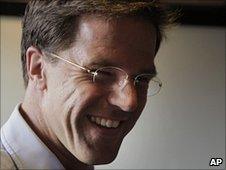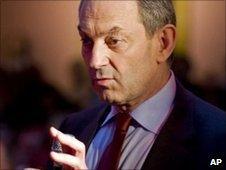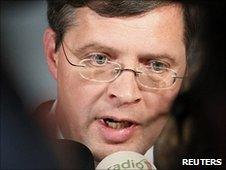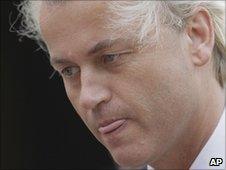At-a-glance: Dutch election rivals
- Published
Following the results of a general election in the Netherlands, parties are expected to spend weeks negotiating over the formation of a new government.
With nearly all votes counted the Liberal Party (VVD) was in the lead with 31 seats in the 150-seat parliament, one seat ahead of Labour, while the anti-immigration Freedom Party of Geert Wilders made strong gains.
Here is a guide to the key party figures.
MARK RUTTE - LIBERAL PARTY (VVD)
The favourite to become the next prime minister is Mark Rutte, a 43-year-old former manager at Unilever who has led the VVD since 2006.

Mark Rutte had emerged as the frontrunner ahead of the election
The party is seen to have benefited from an increasing focus on economic issues and budget cuts in the run-up to the vote.
The Dutch deficit is expected to reach 6.3% this year and Mr Rutte has proposed budget cuts of at least 20bn euros (£17bn, $24bn) over four years, to be achieved by measures including higher taxes, raising the retirement age, and cutting the number of government ministers.
The Liberals could now try to form a coalition with Labour, possibly drawing in the smaller Green Left and Liberal Democrat parties as additional partners. Mr Rutte has set himself a deadline of 1 July to form a government.
There was speculation ahead of the vote that the VVD would consider including the far-right Freedom Party in a coalition.
JOB COHEN - LABOUR (PvdA)
Formerly the mayor of Amsterdam, Mr Cohen, 62, took over the leadership of the Labour Party after the governing coalition collapsed in February and the party's former leader, Wouter Bos, resigned.

Job Cohen has clashed with Geert Wilders over immigration
A law professor from whose grandparents were Holocaust victims, he has pushed a conciliatory approach to immigration, clashing with far-right candidate Geert Wilders over the issue in pre-election debates.
He is credited with building bridges with the Muslim community after the murder of film-maker Theo van Gogh in Amsterdam in 2004.
During this year's campaign, he proposed spending more on education while raising taxes for high earners and banks.
Though polls have suggested that Mr Cohen was the most popular individual candidate, his party finished just behind the VVD.
JAN PETER BALKENENDE - CHRISTIAN DEMOCRATS (CDA)
Mr Balkenende, 54, had been prime minister for nearly eight years, heading four consecutive coalition governments that all collapsed before the end of their mandate.

Jan Peter Balkenende had been Dutch prime minister since 2002
The CDA won 41 seats in the 2006 election, but voters evidently thought it was time for a change and the party suffered big losses, winning just 20 seats in Wednesday's poll.
Mr Balkenende immediately resigned as party leader.
In February, Mr Balkenende's coalition with Labour, and the smaller Christian Union, fell apart when Labour refused to extend the Dutch military mission in Afghanistan.
Mr Balkenende served as a councillor in the suburbs of Amsterdam before becoming an economic spokesman and then leader of his party.
A graduate in economics and law, he has built a reputation for reliability. He is also a devout Calvinist and a former professor of Christian philosophy.
GEERT WILDERS - PARTY FOR FREEDOM (PVV)
Geert Wilders, 46, is the political heir of the far-right, anti-immigrant Pim Fortuyn, who was assassinated in 2002. He has campaigned on a pledge to stop the "Islamisation of the Netherlands". He wants the Koran banned, and has suggested a tax on headscarves worn by Muslim women.

Geert Wilders faces a trial for alleged racial incitement
Mr Wilders faces trial later this year on charges of inciting racial hatred with his short film on Islam, Fitna, and lives under constant police protection because of death threats against him.
The Freedom Party received a boost in local elections in March, winning seats in Almere and The Hague, and rising to the top of the opinion polls.
Subsequently, analysts said immigration and integration had dropped down the agenda amid growing concerns about the economy, and Mr Wilders trailed his three main opponents in opinion polls.
But in a surprise result the party more than doubled its number of parliamentary seats, increasing its presence from nine to 24 seats.
Mr Wilders has said he wants to participate in government, but it is not clear whether the other mainstream parties would accept him as a partner.
- Published10 June 2010
- Published9 June 2010